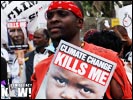 The United Nations Climate Change Conference in Durban, South Africa, has ended with an agreement to start negotiations for a new legally binding climate treaty to be decided by 2015 — and to come into force by 2020. Negotiators also agreed to a second commitment period under the Kyoto Protocol and the initial design of a Green Climate Fund. Many environmental groups say the agreement does not do enough to deal with the climate crisis. “It is really not the important milestone in building a climate regime that many have called it, including the United States and the European Union,” says Kate Horner, a policy analyst at Friends of the Earth International. “Instead, what it is is a further milestone in a very long history of the wealthy world backtracking on their existing promises and reneging on existing obligations. The platform will delay action for five to 10 years while a new treaty is being negotiated and ratified. It will lock in the low levels of ambition. And really, I think the most damaging part of it is it’s an attempt to shift the burden of this problem on to developing countries who have contributed less.” The outcome of the U.N. climate summit could be especially damaging for Africa. “Africa is off the map. Yet Africa is the [continent] that is going to burn because of the indecision and the weak decisions that have come out of this gathering here in Durban,” notes Bobby Peek, director of groundWork, a South African-based environmental justice organization.
The United Nations Climate Change Conference in Durban, South Africa, has ended with an agreement to start negotiations for a new legally binding climate treaty to be decided by 2015 — and to come into force by 2020. Negotiators also agreed to a second commitment period under the Kyoto Protocol and the initial design of a Green Climate Fund. Many environmental groups say the agreement does not do enough to deal with the climate crisis. “It is really not the important milestone in building a climate regime that many have called it, including the United States and the European Union,” says Kate Horner, a policy analyst at Friends of the Earth International. “Instead, what it is is a further milestone in a very long history of the wealthy world backtracking on their existing promises and reneging on existing obligations. The platform will delay action for five to 10 years while a new treaty is being negotiated and ratified. It will lock in the low levels of ambition. And really, I think the most damaging part of it is it’s an attempt to shift the burden of this problem on to developing countries who have contributed less.” The outcome of the U.N. climate summit could be especially damaging for Africa. “Africa is off the map. Yet Africa is the [continent] that is going to burn because of the indecision and the weak decisions that have come out of this gathering here in Durban,” notes Bobby Peek, director of groundWork, a South African-based environmental justice organization.
Climate Activists: Durban Deal is “Very Weak” Agreement, Lacks “Ambition, Equity, Justice”






